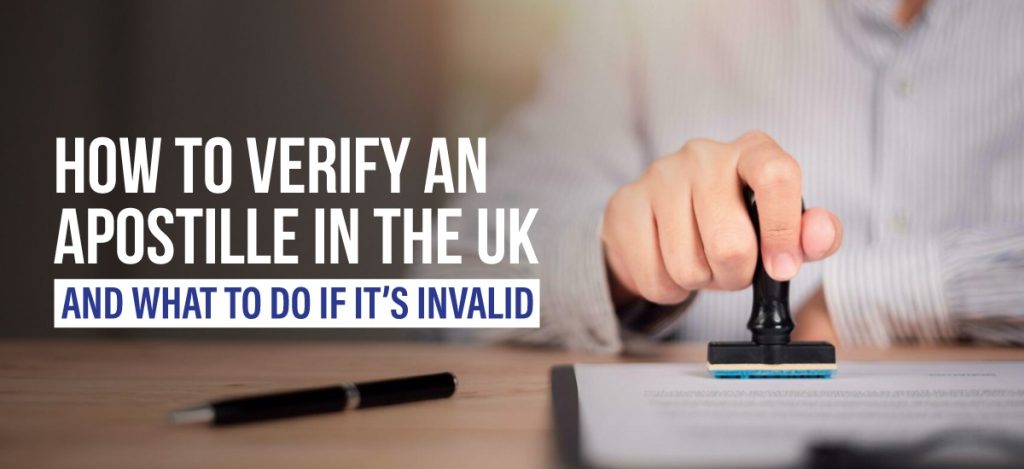In an increasingly globalised world, documents often cross borders for immigration, education, legal, and business purposes. But how do foreign authorities trust that a UK-issued document is authentic? The answer lies in the Apostille certificate, a key legalisation tool under the Hague Convention. However, receiving an Apostille is not the end of the way. It’s equally important to verify an Apostille to confirm it’s valid, recognised, and compliant with the receiving country’s requirements.
In this guide, we’ll walk you through the process of verifying an Apostille in the UK, explain why some Apostilles are rejected, and outline what to do if yours is found to be invalid. With official apostille verification now available online, verifying the legitimacy of your document has never been simpler.
Understanding the Apostille Process
Before delving into verification and possible rejections, it’s essential to learn what an Apostille is. In the United Kingdom, an Apostille is issued by the Foreign, Commonwealth and Development Office (FCDO). It confirms that the signature, stamp, or seal on a document is genuine and that the document is fit for use in countries that are part of the Hague Apostille Convention.
Once the Apostille is affixed, your UK document becomes legally acceptable in over 120 countries, provided all requirements are met, without further embassy legalisation. However, that doesn’t eliminate the need to verify an Apostille, especially when handling crucial international matters.
How to Verify an Apostille in the UK
It’s crucial to verify an Apostille as soon as you acquire it to avoid delays or legal obstacles. Here’s how to make sure it’s authentic:
1. Identify the Apostille
Make sure that an appropriate Apostille certificate accompanies your document.
2. Locate the Unique Reference Number
Every UK Apostille includes a unique serial number issued by the Foreign, Commonwealth and Development Office (FCDO).
3. Use the Online Verification Tool
You can verify your UK-issued certificate using the official apostille online verification tool provided by the FCDO. We will assist you in this process.
4. Cross-Check Information
Ensure that the Apostille details (name, date, and title of the document) match the information on the original document once it has been confirmed. Even little differences can create suspicions.
5. Seek Professional Help If Needed
If you encounter issues during apostille verification, consult a reputable legalisation service provider, such as Helpline Group. We can assist with verification, re-issuance, and any country-specific requirements.
What to Do If the Apostille Is Invalid
An Apostille can be rejected for many reasons. Here’s what could go wrong and how to respond:
1. Non-Member Country
The Apostille is only valid in nations that are part of the Hague Convention. If you submit your document from a non-member country, additional steps, such as embassy attestation, may be required.
2. Incomplete or Incorrect Documentation
Mistakes in the base document, such as missing information, incorrect formatting, or unreadable text, may result in rejection, even if the Apostille itself is valid. Always check your documentation one more time before submission.
3. Expired or Outdated Documents
Date restrictions are mandatory for several receiving Officials. Some nations accept only Apostilles issued within the past 90 days.
4. Improperly Attached Apostille
If the Apostille is loosely affixed, covers vital information, or is physically damaged, it can be considered invalid. The UK FCDO uses embossed stamps to ensure these are intact and visible.
5. Suspected Fraud or Forgery
If there are any suspicious doubts about the legitimacy of the signature, seal, or content, the Apostille may be rejected. Never submit forged, edited or misleading documents.
6. Special Country-Specific Requirements
Even Hague member countries may have additional verification steps for specific documents. Academic certificates, for instance, may require both apostille verification and validation from the institution that awarded them.
How to Avoid Apostille Rejection
Follow these best practices to eliminate the risk of having your Apostille rejected abroad:
- Ensure your documents are correctly prepared before requesting an Apostille.
- Use only trusted, government-recognised Apostille services.
- Verify your Apostille online as soon as you receive it.
- Understand the legalisation rules of the destination country.
- Consult a professional for advice if your case is complex or time-sensitive.
Helpline Group – Your Trusted Partner for Apostille Verification
A UK-issued Apostille is a crucial component of international document recognition; however, it’s your responsibility to ensure that it’s accurate, valid, and compliant with the destination country’s requirements. At Helpline Group, we provide comprehensive support for Apostille services in the UK, from guiding you through the application process to verification, re-issuance, and country-specific legislation. With over 25 years of experience and a strong international presence, we help individuals, professionals, and businesses ensure their documents are accepted globally without hassle.
Don’t take chances with critical paperwork. Let Helpline Group handle your Apostille services with confidence, accuracy, and unmatched expertise.
